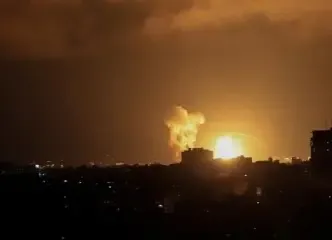Did Recent Airstrikes in Afghanistan Involve Pakistan?

Synopsis
Key Takeaways
- Pakistan denies airstrike claims by the Taliban.
- Increased military presence raises concerns of escalating conflict.
- The Taliban reported civilian casualties from alleged strikes.
- Trade between Afghanistan and Pakistan has been suspended.
- Dialogue is crucial for regional stability.
New Delhi, Nov 26 (NationPress) The Pakistani military has reportedly denied claims from the Taliban that it conducted airstrikes in Afghan territories during the night between Monday and Tuesday (November 24-25). This denial emerges as there is a noticeable increase in the presence of armed forces and military equipment along the volatile border.
This denial raises significant questions about the bombings, particularly given the escalating tensions in the region. It could suggest either a serious misstep, foul play, or an effort to de-escalate hostilities. Reports indicate that the Durand Line has seen a significant buildup of heavy artillery, troop movements, and drone surveillance, which raises concerns about a possible impending cross-border operation following the aerial strikes in Khost, Paktika, and Kunar provinces.
Media outlets in both Afghanistan and Pakistan have stated that Islamabad has officially rejected allegations of recent airstrikes. Reports from regional news sources noted that the Pakistani military labeled the Afghan claims as “baseless.”
Army spokesperson Ahmed Sharif Chaudhry commented on Tuesday that Islamabad “never targets innocent civilians” and emphasized that it publicly announces its actions before any attack. He suggested that the Taliban's accusations might stem from internal conflicts within their group.
A similar incident occurred last month when Taliban fighters retaliated against Pakistani border posts on October 11, leading to a halt in all trade and transit across the troubled Durand Line.
The remarks from Pakistan followed accusations from Kabul, claiming that Islamabad had violated Afghan airspace with multiple midnight strikes. The Taliban asserted that these attacks resulted in the deaths of 10 people, including nine children and a woman, and injuries to four civilians in Kunar and Paktika.
Describing Pakistan's actions as a violation of Afghan airspace and international standards, the Taliban spokesperson, Zabihullah Mujahid, labeled the strikes as “aggression” and a crime, warning of a forthcoming response at their discretion. He added that such cross-border attacks undermine established regional principles and affirmed that the Taliban would not let these actions go unanswered.
Increased movements of troops and equipment have been reported along several border sectors, including Chaman-Spin Boldik, Angoor Adda, Kurram-Nangahar, and Torkham.
A social media post from the United Nations Assistance Mission in Afghanistan (UNAMA) referred to the strike but faced scrutiny for not identifying the perpetrator. “At least 10 civilians were killed and six injured in airstrikes in Khost and Kunar provinces in #Afghanistan last night. Most victims were children. UNAMA once again urges respect for international law to safeguard civilians and prevent harm,” it stated on Tuesday. A social media user claimed, “These are the 10 civilians martyred by the Pakistani Military Regime’s airstrikes in Khost. Children, infants, and a mother...” Another user questioned, “Why aren’t you stating WHO executed the airstrikes?” asserting, “It was Pakistan.”
However, reports have indicated that Pakistani authorities have conducted targeted operations near the border in recent days, branding these actions as counter-terrorism efforts linked to recent attacks within their territory. These operations reportedly resulted in the deaths of numerous militants in Kurram and neighboring areas.
The ongoing tensions have led to various skirmishes along the disputed border, causing intermittent closures and impacting one of the major transit points for the landlocked Afghanistan.
Currently, trade has been suspended at the Afghanistan-Pakistan border since November 12, with Kabul urging the business sector to seek alternative routes. Efforts by regional entities to mediate between the two nations led to a temporary ceasefire agreement, but a consensus on specific peace implementation strategies has yet to be reached, despite two consecutive meetings.









